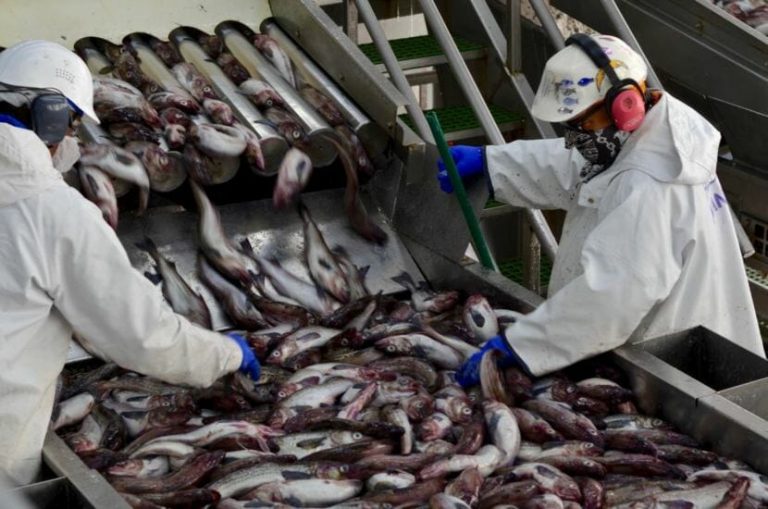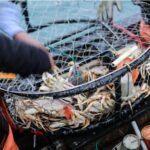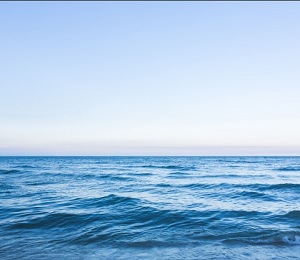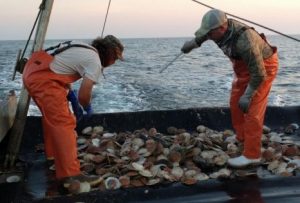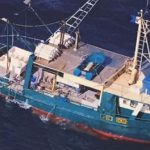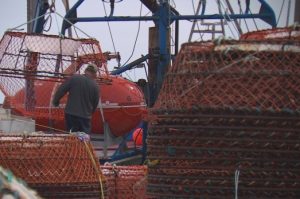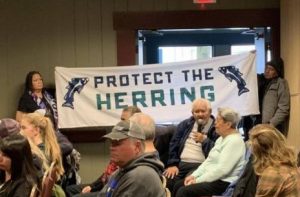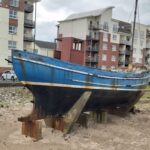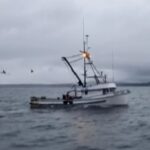Tag Archives: Department of Environmental Conservation.
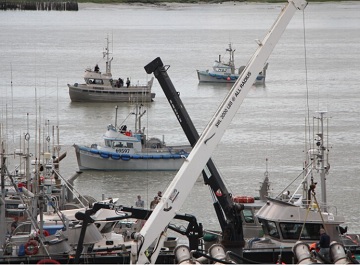
Silver Bay Seafoods agrees to pay fine for illegal dumping in the Naknek River
Sitka-based Silver Bay Seafoods earlier this month agreed to pay a fine of $467,469 for illegal dumping at its Naknek River facility in Bristol Bay. The company has also agreed to address violations of its state permit to discharge pollutants. The state Department of Environmental Conservation said in a press release that Silver Bay “repeatedly discharged significantly more fish waste into the Naknek River than permitted” in 2017 and 2020. State inspectors also found numerous violations at the facility during a scheduled inspection last year, like discharging bloody water. >click to read< 12:11
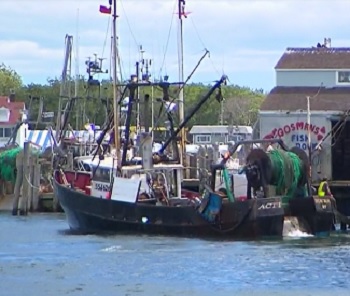
Long Island Commercial Fishermen oppose Governor Cuomo’s artificial reef expansion plan
Gov. Andrew Cuomo’s proposal to expand artificial reefs in the waters off Long Island is hitting a wave of opposition from commercial fishermen who say it would rob them of their fishing grounds and income. The state wants to double the size of the reefs.,, Malcolm McClintock, who owns two fishing trawlers, says he has already spent a long time learning where the existing artificial reefs are. He says more would create a larger problem for an industry already under stress. “One more thing piled on top of many other things. Every little bit hurts.” video, >click to read< 12:40

In the middle of a socio economic disaster, Town of Riverhead cracks down on bunker fishermen
Even as Long Island’s commercial fishing industry reels from coronavirus-shuttered markets and restaurants, one East End town this week began cracking down on one of the few remaining viable sectors for local baymen: fishing for menhaden. Menhaden fishermen who launch their boats from a town ramp in Riverhead were greeted by a bay constable Wednesday morning who said the men would be cited for using seine nets that stretch beyond the 50-foot limit allowed by the town. “I’ve been fishing there for the last 30 years, and they decide to pick now, in the middle of a socio economic disaster, to enforce a silly code that’s not even applicable?” said Will Caldwell, a Hampton Bays fishermen who received a summons with a 30-day court date. >click to read< 09:37
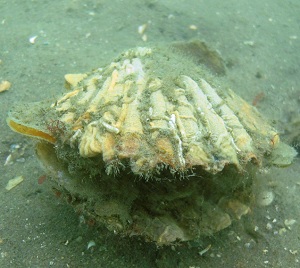
Marine Biologist Doubts Parasite Was Only Cause of Bay Scallop Collapse
A parasite that the New York State commissioner of environmental conservation called “a significant threat” to the Peconic Bay scallop fishery has been detected in a sample of bay scallops from Shelter Island — and may have been a factor in the near total collapse of the adult scallop population throughout the estuary last year. A type of single-cell protozoan from a group known as coccidia, the parasite found,, >click to read< 17:17
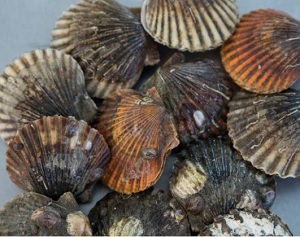
Peconic Bay scallops die-off tied to newly detected parasite
The catastrophic die-off of Peconic Bay scallops in eastern Long Island waters may be tied to a previously undetected parasite that can infect the kidneys of adult and juvenile scallops, state regulators reported Friday. The specific parasitic organism, known as coccidian parasite, was discovered in kidney tissue of all 32 scallops collected and sampled from Shelter Island’s Hay Beach last November, >click to read< 16:28
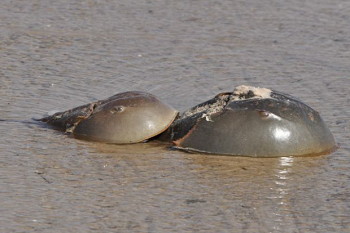
Concerns over horseshoe crabs spur discussion about limiting harvest
When Long Island beaches come alive at high tide with hundreds of thousands of horseshoe crabs, looking to spawn under the spring and summer moons, it’s also time for many fishermen who track those cycles to harvest the arthropods at their most plentiful. Most use their catch for bait, but some sell them to markets, where they are shipped either for other fishermen’s purposes or medical uses.,, Jamie Hummel, who fishes from Hampton Bays, said baymen like him take only their limit, and need only enough to keep their conch pots baited through the year. He said if anything regulators should look to limit or end the market for selling horseshoe crabs. >click to read< 14:25
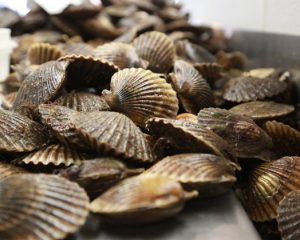
Long IIsland: Effort to salvage juvenile scallops called off for lack of candidates
An unprecedented effort by conservationists, baymen and the state to save a vulnerable population of juvenile scallops by transferring them to deeper waters has been called off after only a day because of a lack of mollusks to move. In response to a scallop die-off, the state Department of Environmental Conservation moved quickly last week to approve a new Scallop Salvage and Relay permit to allow vulnerable scallops in an area of water near Orient Harbor to be transferred to deeper, safer waters, with the hope they’d survive and spawn next summer. >click to read< 13:44
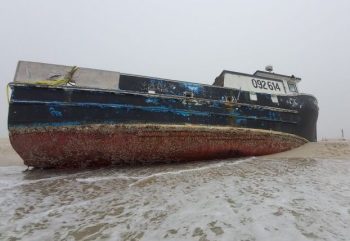
Temporary reprieve for fishing boat washed up on Jones Beach
An old and battered 40-foot-long wooden fishing boat that washed up on Jones Beach State Park last week and was abandoned by its owner has won a temporary last-minute reprieve, officials said. Instead of being broken up and hauled off as initially planned, the Roger Ventures will be inspected to see if it might be reused by a state agency, said George Gorman, Long Island regional director, New York State Office of Parks, Recreation & Historic Preservation. On June 9, “the Captain Leroy III was towing the Roger Ventures, and they had to drop the tow;,, >click to read<18:56

New York’s energy policy depends on an impossible fantasy
Last Wednesday, the Cuomo administration blocked construction of the proposed Northeast Supply Enhancement project, a 24-mile gas pipeline that would run from New Jersey across New York Bay to near the Rockaways.,, was cheered by environmental groups,..Wind-energy projects, too, are facing fierce opposition.,,, What about offshore? Cuomo wants 9,000 megawatts of offshore wind installed in New York waters by 2035. But the Long Island Commercial Fishing Association and other fishing groups are adamantly opposed,,,In short, renewables can’t replace natural gas. >click to read<20:58
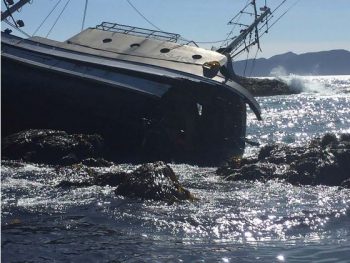
Wind, waves hamper efforts to salvage grounded longliner
The 70-foot longliner Masonic remains on the rocks on the Spanish Islands, and rough seas and high winds may prevent salvage crews from recovering vessel itself, or the large quantity of fuel on board. The Masonic is in a bad spot. Hard aground on the rocks of the Spanish Islands, about 80 miles south of Sitka, the 1923 vintage longliner has been pushed on its side, and is being battered by waves and wind. Salvage crews were able to board the Masonic on May 8, just one day after it went aground, and plugged fuel vents. But since then no one’s been able to return to the Masonic, and the weather has been taking a huge toll on the boat. >audio report, click to read<11:41
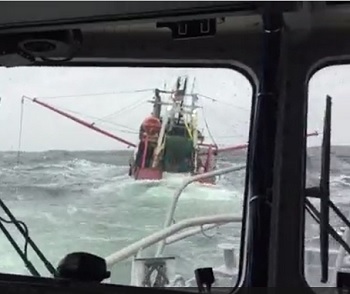
Sunken boat near Fishers Island monitored for pollution threat
The U.S. Coast Guard and the state Department of Environmental Conservation are assessing potential pollution off the coast of Fishers Island after a “patchy sheen” was seen surrounding a fishing trawler that sank Sunday morning. Two men aboard a commercial fishing boat named “All For Joy” and based out of Hampton Bays issued a distress call about 7:30 a.m. Sunday after they began taking on water in a fish hold. They abandoned the trawler about two hours later and were pulled aboard a Coast Guard rescue vessel a minute before the All For Joy capsized. The boat is owned by Rick Lofstad, who could not be reached for comment Tuesday. >click to read<15:43
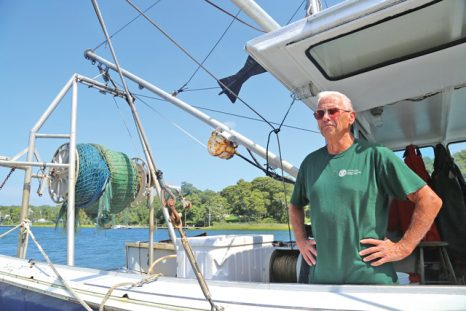
New York Commercial fishermen hit with two-week fluke fishing closure
The closure began Sunday, and when it reopens Aug. 1, fishermen will be limited to a daily limit of 50 pounds of fluke. “That’s not even a box of fish,” said Riverhead fisherman Phil Karlin, who noted boxes are typically 60 or 70 pounds. The state Department of Environmental Conservation that enforces the federal quota restrictions notified fisherman of the closure via mail several days before, saying it was necessary to preserve fish for the fall, Mr. Karlin said. “It’s putting a hardship on all fishermen,” Mr. Karlin said. “We’ve had it tough as it is. To close it in the middle of the summer like this is not good.” >click to read<07:49
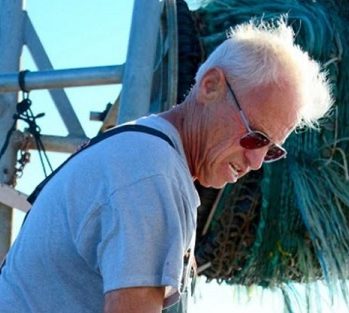
NYDEC halts commercial fluke fishery for about two weeks, sets harvest limit
New York State will close its commercial fishing grounds, a staple of the Long Island fishing fleet, for about two weeks effective Sunday. The closure, which applies to fishing in state waters up to 3 miles from shore, will last until month’s end, when it reopens with a harvest limit of 50 pounds per day. Local commercial fishermen, who dealt last month with a similar closure of another plentiful staple in New York waters of black sea bass, say the closure is another blow to their livelihood at a time of pricing stresses and amid state pressure to ease federal restrictions. “It really hurts us,” said Phil Karlin,,, >click to read<13:46
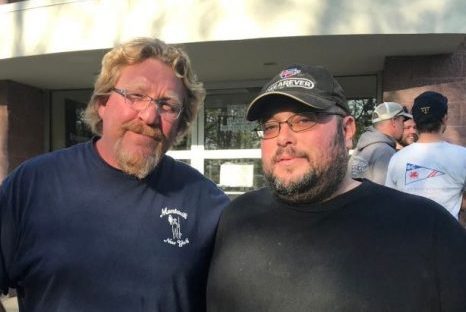
LI fishermen object to black sea bass quota deal
Fishermen critical of a recent deal to ease black-sea bass regulations demanded further state action at a fisheries meeting Tuesday, but officials said the interstate agreement was the best they could get this year. Around a dozen angry party- and charter-boat captains attended a meeting of the Marine Resources Advisory Council in Setauket Tuesday night to raise objections to the deal, which effectively nixed a planned 12 percent reduction in the state’s recreational black sea bass quota this year. They and a supporting lawmaker cited a more lenient quota for competing New Jersey fishermen, saying anglers would favor the Garden State given its earlier season open and ability to keep more fish at a smaller size. >click to read<15:20
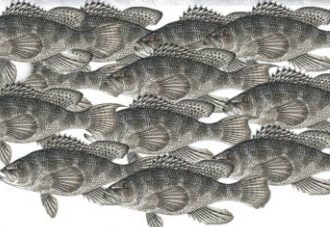
Fisheries commission to vote on NY black sea bass appeal
An interstate fisheries commission is scheduled to vote Thursday on New York’s appeal for a less stringent quota on locally abundant black sea bass. New York recreational fishermen and women could face a 12 percent reduction in the allowable catch for black sea bass this year under a federal mandate.,, DEC commissioner Basil Seggos said the state was “willing to go to the bear cage” to fight the planned reductions, including filing suit and going into noncompliance on the rules if the federal government did not act. The state has made similar demands to change New York’s share of the commercial fluke quota. >click to read<08:20
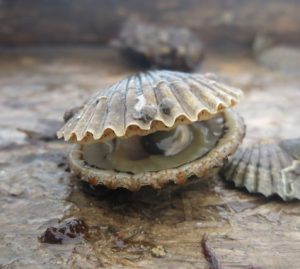
DEC decides against extending the scalloping season
The last time Peconic Bay scallops were this plentiful was the winter of 2015, just before six weeks of hard weather put what should have been a five-month harvest on hold. Back then, the New York State Department of Environmental Conservation responded by extending the season for commercial scalloping in state waters by a month to make up for lost time, but this year, the season will end in March, right on schedule. In a statement on Monday,,, >click to read<11:53
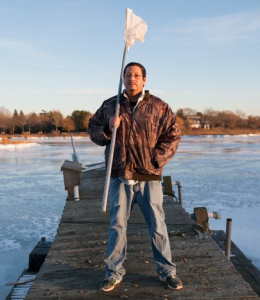
Indians in the Hamptons Stake Claim to a Tiny Eel With a Big Payday
Shinnecock Indians have fished the local waters here on the East End of Long Island since before European settlers first appeared in the 1600s, up through its evolution into the wealthy summer playground known as the Hamptons. So David Taobi Silva, 42, a tribal member who lives on the reservation just outside of Southampton village, says that when he harvests fish locally, he needs no commercial license from New York State’s Department of Environmental Conservation and is exempt from its strict regulations to protect fish populations. But that is not how the state sees it,,, >click to read< 20:40
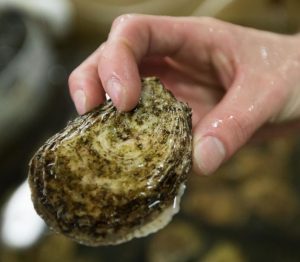
Islip Town plans to open up more shellfish beds in bay
Islip Town’s program to lease acres of shellfish beds to private companies is on track to expand from 125 acres to more than 1,500 acres. The proposed change must be approved by the state Department of Environmental Conservation, but will be good news for the roughly 120 people and businesses on a waiting list to lease the bottom of the Great South Bay, town officials said. >Photo’s click here to read< 09:22
September 27, 1981 – BAYMEN FEARFUL AS SEWER START NEARS – The Island’s remaining 10,000 independent baymen fear that the opening of the Southwest Sewer District next month will mark the beginning of the end of commercial shell-fishing in the Great South Bay. >click here to read< 12:02

DEC Commissioner Basil Seggos says NY commercial fishermen ‘getting a raw deal’
New York commercial fishermen are “getting a raw deal” in federal fisheries quotas, and the state will follow through on a lawsuit early next year if meetings in December don’t fix the problem, the state’s top fisheries official said last week. At a meeting at the East Hampton Public Library on Thursday, Basil Seggos, commissioner of the state Department of Environmental Conservation, listened to two full hours of complaints about state and federal regulations and management of fisheries, including restrictive quotas, inaccurate fish-population data, difficulty in getting and transferring permits, and “Gestapo”-like tactics of federal observers on local fishing vessels. click here to read the story 10:10
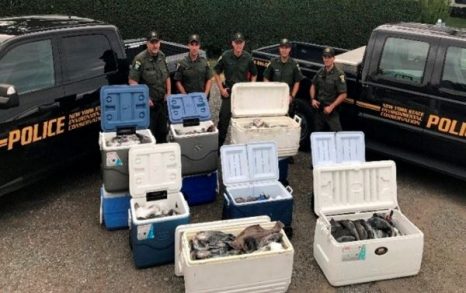
Opinion: Fishing Violations? Cite Captains and Crew
Two recent high-profile incidents involving Montauk party-fishing boats have drawn attention to a problem on the water in which paying customers take too many or too small fish, while the crews, captains, and vessel owners evade responsibility.,,, It also is interesting to note that the state appears to be finally paying attention to how recreational fishing affects fish stocks. For decades the majority of its enforcement efforts was directed toward commercial harvesters, despite statistics that, in many cases if not all, indicated that sportfishing had an equal or greater impact on the resource. click here to read the op-ed 12:05
D.E.C. Ticketed Montauk Anglers for Dumping Fish
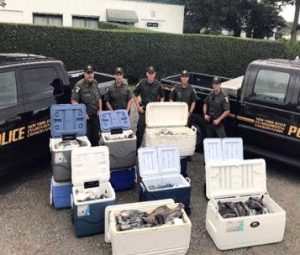 Marine enforcement officers from the State Department of Environmental Conservation, on patrol in Montauk Harbor on Aug. 31, saw what they estimated was hundreds of pounds of fish being thrown overboard from a Montauk party boat and wound up ticketing eight people, including the boat’s captain, Keith Williams. According to a D.E.C. spokeswoman, the officers approached the 75-foot Fin Chaser, based on Star Island, and ordered the anglers to stop what they were doing. Their orders were ignored, she said. The party boat’s customers were cited for possessing too many black sea bass and porgies, undersized black sea bass and summer flounder, and for failure to stop dumping upon command. click here to read the story 08:25
Marine enforcement officers from the State Department of Environmental Conservation, on patrol in Montauk Harbor on Aug. 31, saw what they estimated was hundreds of pounds of fish being thrown overboard from a Montauk party boat and wound up ticketing eight people, including the boat’s captain, Keith Williams. According to a D.E.C. spokeswoman, the officers approached the 75-foot Fin Chaser, based on Star Island, and ordered the anglers to stop what they were doing. Their orders were ignored, she said. The party boat’s customers were cited for possessing too many black sea bass and porgies, undersized black sea bass and summer flounder, and for failure to stop dumping upon command. click here to read the story 08:25
NewYork State to close commercial fluke fishery Sept. 1
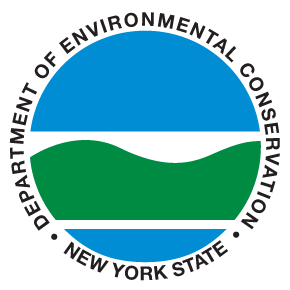 The notice by the Department of Environmental Conservation sent to commercial fluke permit holders Monday said the closure, enacted to preserve a fourth-quarter fishing period from October through December, “will remain in effect until further notice.”,,, Local fishermen say they had already been straining under an exceptionally low daily quota of just 50 pounds through most of the year, even though fluke have been relatively abundant this year. “I’m so angry,” said Mattituck fisherman Arthur Kretschmer, 61, who operates a bottom-fish trawler on the eastern Long Island Sound. Speaking of regulators he said, “These people have no clue how it affects people’s lives when they close down a fishery. We have nothing left to catch here.” click here to read the story 17:55
The notice by the Department of Environmental Conservation sent to commercial fluke permit holders Monday said the closure, enacted to preserve a fourth-quarter fishing period from October through December, “will remain in effect until further notice.”,,, Local fishermen say they had already been straining under an exceptionally low daily quota of just 50 pounds through most of the year, even though fluke have been relatively abundant this year. “I’m so angry,” said Mattituck fisherman Arthur Kretschmer, 61, who operates a bottom-fish trawler on the eastern Long Island Sound. Speaking of regulators he said, “These people have no clue how it affects people’s lives when they close down a fishery. We have nothing left to catch here.” click here to read the story 17:55
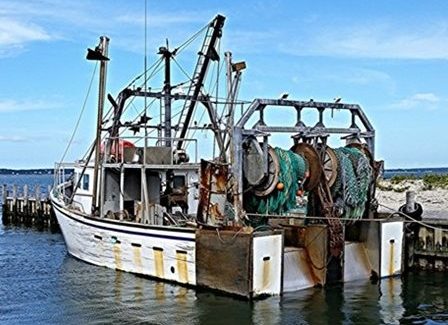
Safe Harbor Bill Becomes Law, Ensures Legal Rights and Protection of Commercial Fishermen in Emergency Situations
Assemblyman Fred W. Thiele Jr. and Senator Ken LaValle today announced that Governor Cuomo signed their Safe Harbor Law on August 21. The bill provides commercial fishing vessels with safe harbor. Safe harbor means immunity from prosecution from State fishing regulations in certain emergency situations.,,, The Safe Harbor Law would apply when a commercial fisherman (1) encounters or is forecasted to encounter unsafe weather, (2) experiences a mechanical problem, that makes the continuation of the voyage unsafe and poses a risk to life and property, (3) experiences a significant medical emergency which requires immediate medical attention necessary to protect the health of any person on board, or (4) experiences loss of essential gear such as support systems that renders the vessel unable to remain at sea. click here to read the story 14:30
New York – State DEC officials agree to meeting over LI fishing permits
 The state Department of Environmental Conservation has agreed to meet with Long Island fishing interests over long-held complaints about access to restricted commercial fishing permits following a move by local legislators seeking quicker action on state fishing rules. The meeting, brokered by Assemb. Fred Thiele (I-Sag Harbor), is expected to address the complexities of acquiring, transferring and even passing to family members permits to fish for vital local fish such as striped bass and fluke. It may also address so-called latent permits, in which a large percentage of existing permits are held but not used. Fishermen also have complained of long-standing moratoriums on certain species of fish. click here to read the story 09:29
The state Department of Environmental Conservation has agreed to meet with Long Island fishing interests over long-held complaints about access to restricted commercial fishing permits following a move by local legislators seeking quicker action on state fishing rules. The meeting, brokered by Assemb. Fred Thiele (I-Sag Harbor), is expected to address the complexities of acquiring, transferring and even passing to family members permits to fish for vital local fish such as striped bass and fluke. It may also address so-called latent permits, in which a large percentage of existing permits are held but not used. Fishermen also have complained of long-standing moratoriums on certain species of fish. click here to read the story 09:29
State officials investigating fish die-off in Hampton Bays
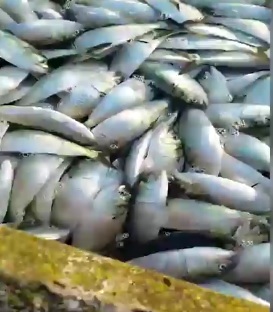 The Shinnecock Canal in Hampton Bays became the scene of a massive fish die-off Monday morning, with tens of thousands of menhaden — more commonly known as bunker — clogging the water surface for hundreds of yards. Authorities, including state Department of Environmental Conservation investigators, responded to the scene Monday. Regional DEC spokesman Bill Fonda said staff investigators were looking into the cause, but that initial indications were the die-off was “probably due to the usual reasons … We don’t see anything so far to indicate it’s chemical” or from a pollutant. Read the story here 13:08
The Shinnecock Canal in Hampton Bays became the scene of a massive fish die-off Monday morning, with tens of thousands of menhaden — more commonly known as bunker — clogging the water surface for hundreds of yards. Authorities, including state Department of Environmental Conservation investigators, responded to the scene Monday. Regional DEC spokesman Bill Fonda said staff investigators were looking into the cause, but that initial indications were the die-off was “probably due to the usual reasons … We don’t see anything so far to indicate it’s chemical” or from a pollutant. Read the story here 13:08
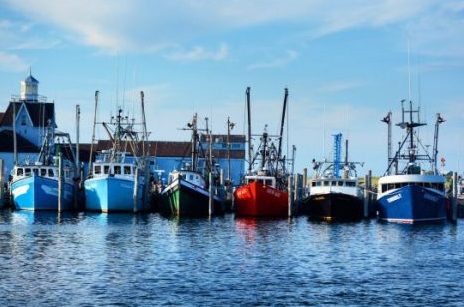
State of New York finalizes safe harbor rules for commercial fishermen
New York has finalized guidelines for commercial fishing boats seeking safe harbor in storms and other adverse conditions, eight months after the state lost a court case against one East End fisherman because the rules weren’t in writing. The state Department of Environmental Conservation says the new safe harbor guidelines will give clarity to fishing boat captains faced with potential dangers at sea by defining the conditions under which they can seek permission to enter New York ports while on federally registered commercial fishing trips. The guidelines require captains to notify the DEC before entering port in the state to seek permission to enter. The DEC said the rules were welcomed by fishermen, but one local fishing advocate argued the guidelines are “toothless” because they don’t grant fishermen any rights. Read the story here 07:56
Supplier takes heat for Price Chopper’s illegally small lobsters
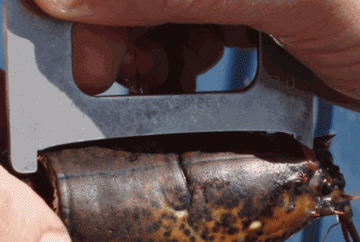 A New England seafood supplier said it deserves the blame for unlawful lobsters being sold by Price Chopper. The Department of Environmental Conservation on Tuesday seized 1,100 pounds of lobster from two Price Chopper supermarkets and a company distribution center after it found illegally small lobsters at stores in Binghamton. “It’s important for people to understand that Price Chopper didn’t knowingly accept short length lobsters from us,” said Dave Madden, an owner of Lobster Trap, a distributor from Cape Cod, Mass. “We delivered them in error.” New York enacted the size restrictions to prevent overfishing, but Lobster Trap said most other Northeastern states are not as strict. That led company workers to mistakenly mix smaller lobsters into the shipment bound for New York. Link 09:12
A New England seafood supplier said it deserves the blame for unlawful lobsters being sold by Price Chopper. The Department of Environmental Conservation on Tuesday seized 1,100 pounds of lobster from two Price Chopper supermarkets and a company distribution center after it found illegally small lobsters at stores in Binghamton. “It’s important for people to understand that Price Chopper didn’t knowingly accept short length lobsters from us,” said Dave Madden, an owner of Lobster Trap, a distributor from Cape Cod, Mass. “We delivered them in error.” New York enacted the size restrictions to prevent overfishing, but Lobster Trap said most other Northeastern states are not as strict. That led company workers to mistakenly mix smaller lobsters into the shipment bound for New York. Link 09:12
New York State DEC Adopts Regulations for the Atlantic Ocean Surfclam Fishery
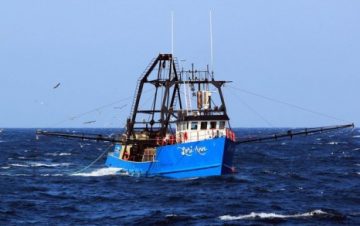 New York State Department of Environmental Conservation (DEC) Commissioner Basil Seggos today announced the adoption of regulations for the Atlantic Ocean surfclam fishery to ensure consistency with the harvest management measures of the State’s Atlantic Ocean Surfclam Fishery Management Plan (FMP). The regulations take effect immediately. “These regulations will help promote the sustainability of the surfclam fishery and economic viability of its traditional New York-based fishing interests by ensuring that the distribution of fishing quota is fair for all participants,” Commissioner Seggos said. An apparent loophole in the surfclam vessel replacement regulations has allowed one or more vessels to catch more than one IFQ in a year. This regulation closes this regulatory loophole that has allowed multiple individual fishing quotas to be fished by one or more vessels which has negatively impacted fishing businesses with vessels limited to one individual fishing quota. Read the rest here 08:24
New York State Department of Environmental Conservation (DEC) Commissioner Basil Seggos today announced the adoption of regulations for the Atlantic Ocean surfclam fishery to ensure consistency with the harvest management measures of the State’s Atlantic Ocean Surfclam Fishery Management Plan (FMP). The regulations take effect immediately. “These regulations will help promote the sustainability of the surfclam fishery and economic viability of its traditional New York-based fishing interests by ensuring that the distribution of fishing quota is fair for all participants,” Commissioner Seggos said. An apparent loophole in the surfclam vessel replacement regulations has allowed one or more vessels to catch more than one IFQ in a year. This regulation closes this regulatory loophole that has allowed multiple individual fishing quotas to be fished by one or more vessels which has negatively impacted fishing businesses with vessels limited to one individual fishing quota. Read the rest here 08:24
On the verge of a premature Commercial bluefish shutdown, Senator Schumer fires off a letter!
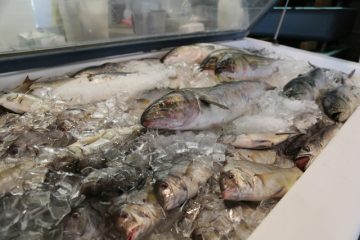 The decision, which could be made any day now, is based on data from the Marine Recreation Information Program, which is the program NOAA uses to record all of its recreational fishing data. Recent data shows a high number of bluefish were caught last year by recreational fishers. The DEC, however, has argued in a letter sent to NOAA that it finds the data “troubling” and is urging officials to reevaluate the findings. On Monday, Senator Charles Schumer (D-NY) also called on NOAA to take a second look, writing in a letter to the organization that “any decision on bluefish fishing season must be based on up-to-date science, period.” Mr. Schumer’s request follows a letter sent to NOAA last Tuesday by DEC commissioner Basil Seggos, who expressed concern that a mid-season closure would be a “devastating blow to our commercial fisheries.” Bonnie Brady of the Long Island Commercial Fishing Association said that while ending the bluefish season this early would have some impact on related East End businesses, it’s a major blow to commercial fishermen. Read the article here 14:35
The decision, which could be made any day now, is based on data from the Marine Recreation Information Program, which is the program NOAA uses to record all of its recreational fishing data. Recent data shows a high number of bluefish were caught last year by recreational fishers. The DEC, however, has argued in a letter sent to NOAA that it finds the data “troubling” and is urging officials to reevaluate the findings. On Monday, Senator Charles Schumer (D-NY) also called on NOAA to take a second look, writing in a letter to the organization that “any decision on bluefish fishing season must be based on up-to-date science, period.” Mr. Schumer’s request follows a letter sent to NOAA last Tuesday by DEC commissioner Basil Seggos, who expressed concern that a mid-season closure would be a “devastating blow to our commercial fisheries.” Bonnie Brady of the Long Island Commercial Fishing Association said that while ending the bluefish season this early would have some impact on related East End businesses, it’s a major blow to commercial fishermen. Read the article here 14:35
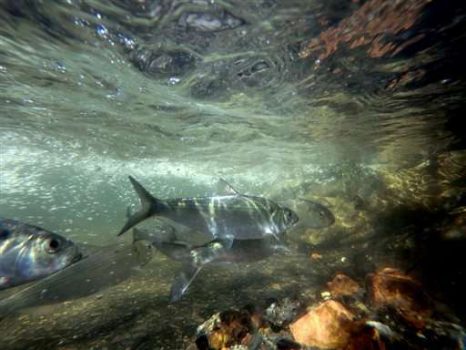
River Herring spawn in NY tributary for 1st time in 85 years
A few days after a long-abandoned industrial dam was removed from the mouth of a Hudson River tributary this spring, hundreds of river herring swarmed up into the shallow waters to spawn for the first time in 85 years. The removal of the rusted steel dam on the Wynants Kill near Albany was the first of what ecologists hope will be many barriers removed in Hudson tributaries to restore spawning habitat for herring and other ocean-going species that have been devastated by habitat loss, pollution and overfishing. “There are more than 1,500 dams in the Hudson estuary watershed, most of them no longer in use,” said Frances Dunwell, coordinator of the state Department of Environmental Conservation’s Hudson River Estuary Program. “One of the key items on our to-do list by 2020 is to remove as many of these barriers as possible.” Read the rest here 12:01

































